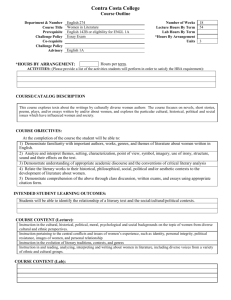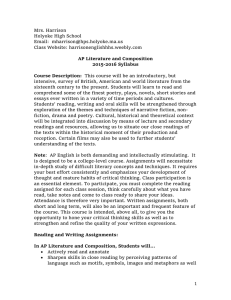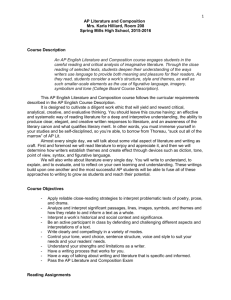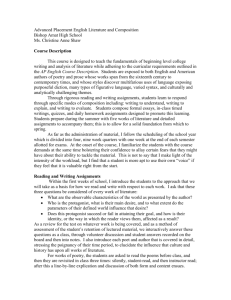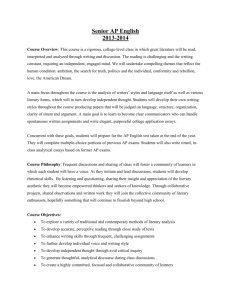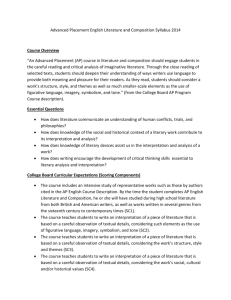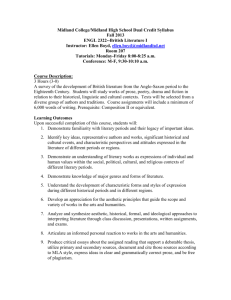English 12 Syllabus
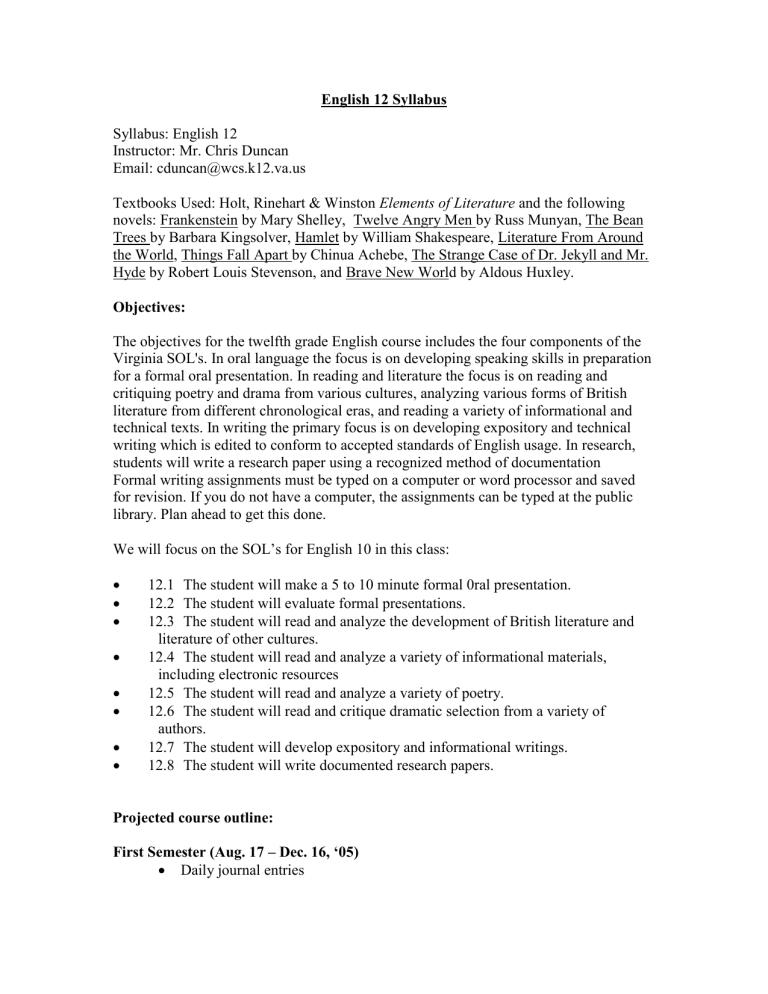
English 12 Syllabus
Syllabus: English 12
Instructor: Mr. Chris Duncan
Email: cduncan@wcs.k12.va.us
Textbooks Used: Holt, Rinehart & Winston Elements of Literature and the following novels: Frankenstein by Mary Shelley, Twelve Angry Men by Russ Munyan, The Bean
Trees by Barbara Kingsolver, Hamlet by William Shakespeare, Literature From Around the World, Things Fall Apart by Chinua Achebe, The Strange Case of Dr. Jekyll and Mr.
Hyde by Robert Louis Stevenson, and Brave New World by Aldous Huxley.
Objectives:
The objectives for the twelfth grade English course includes the four components of the
Virginia SOL's. In oral language the focus is on developing speaking skills in preparation for a formal oral presentation. In reading and literature the focus is on reading and critiquing poetry and drama from various cultures, analyzing various forms of British literature from different chronological eras, and reading a variety of informational and technical texts. In writing the primary focus is on developing expository and technical writing which is edited to conform to accepted standards of English usage. In research, students will write a research paper using a recognized method of documentation
Formal writing assignments must be typed on a computer or word processor and saved for revision. If you do not have a computer, the assignments can be typed at the public library. Plan ahead to get this done.
We will focus on the SOL’s for English 10 in this class:
12.1 The student will make a 5 to 10 minute formal 0ral presentation.
12.2 The student will evaluate formal presentations.
12.3 The student will read and analyze the development of British literature and literature of other cultures.
12.4 The student will read and analyze a variety of informational materials, including electronic resources
12.5 The student will read and analyze a variety of poetry.
12.6 The student will read and critique dramatic selection from a variety of authors.
12.7 The student will develop expository and informational writings.
12.8 The student will write documented research papers.
Projected course outline:
First Semester (Aug. 17 – Dec. 16, ‘05)
Daily journal entries
Weekly grammar activities, vocabulary, writing assignments (essays, poetry, letters)
Persuasive essay
Resumé; Interview
Personal Essay
Compare/contrast Essay
Literary genre/literary elements (epic, poetry, drama, novel, fable; figures of speech,
Imagery, theme, character, plot, setting, tone, irony)
Anglo-Saxon Period 449-1066 (epic Beowulf )
Medieval Period 1066-1485 ( Canterbury Tales; Ballads)
Renaissance Period 1485-1660 ( carpe diem poetry ; Tragedy of Macbeth,
Paradise Lost)
Novel/ Play – Heart of Darkness / Twelve Angry Men
Research Paper (four weeks)
Second Semester (Jan. 3 – May 24, ‘06)
Daily journal entries
Weekly grammar activities, vocabulary, writing assignments, group work
17 th
Century
Restoration and 18 th
Century 1660-1800
Romantic Age 1798-1832 (poetry of Burns, Blake, Wordsworth, Coleridge,
Byron, Shelley, Keats)
19 th Century Victorian literature 1832-1901 (Tennyson, Browning)
20 th Century 1900-Present
Novels/ Plays – The Strange Case of Dr. Jekyll and Mr. Hyde / Things Fall
Apart / Brave New World, and Hamlet.
Expository essays
Poetry
Short Stories; Non-fiction articles; newspaper editorials
*Other reading selections may be included or substituted throughout the semester.
Required Writing Assignments: Required Reading:
1.
Expository Essay and Persuasive Essay Six novels during the school year
2.
College Application/Personal Essay (3 assigned; 3 personal choices)
3.
Résumé
5. Literary analysis
6. Compare/Contrast Essay
7. Writing Journal (Includes warm-up activities, vocabulary, character sketches, assigned quick-writes, grammar)
8. Brochure/Flyer of literary work (computer generated)
9. Research Paper
Grades are earned on the point system. During a 6-week period, approximately
800-900 points are accumulated. The final grade is determined by the student-points earned divided by the teacher-points assigned.
Example: Student points earned = 680; teacher points assigned = 850; therefore:
680 = 80 (Grade for the 6-week period)
850
Grade distribution: Hwk, classwork, quizzes - 15%
Essays, Journal
Major Tests
- 25%
- 60%
Evaluation:
Chapter tests at completion of unit or novel.
Essays, paragraphs, and journal entries: weekly
Quizzes on grammar, speaking, writing or reading: weekly
Make-up: Make-up work is due within 3 school days of an excused absence.
Tutoring: Available upon request
Homework:
Homework must be completed and handed in at the beginning of class, otherwise it will be considered late. With every day late, the assignment will be lowered a letter grade.
After 3 days it will no longer be accepted and the grade will be F. If absent, you get five days to make-up the missed assignment(s). Make-up work is your responsibility! Makeup assignments are completed before/after school, not during the following day’s class time.
Do-Nows:
You will be required to keep a daily journal. The journal will count as a major test grade for each grading period, as well as part of a classwork grade everyday. Students will find the daily topic (or picture, painting, etc., which will serve as a prompt) on the board in class each day. Journal writing will take place during the first 5-10 minutes of class, so please begin writing at the echo of the bell. Another do-now activity will consist of my giving you sentences and paragraphs to edit. You will correct grammatical errors: sentence structure, tense irregularities, misspelled words, etc.
Cheating (including plagiarism) will not be tolerated. The assignment/test/essay/etc. will be given an automatic zero.
Class Rules:
1.
Treat everyone in class with respect. Live by the Golden Rule: treat every person
exactly as you’d like him or her to treat you.
2.
No talking over your fellow students or me.
3.
Act in ways that do not disrupt the learning of your fellow students or my ability to teach.
Consequences of negative behavior:
Any negative behavior—talking out of turn, not staying on task, etc.—will result in you being given a warning. The next time you exhibit negative behavior, you will be required to stay one minute after class. The third time, you will remain two minutes after class and must write on an index card A) details of the negative/ disruptive behavior B) the date, and C) you must sign the card. Continued negative behavior will result in my calling your parents or caregiver to talk about the problem and how we can solve it (if I meet with your parents/ guardian in person, I’ll have your signed cards to show them). If the behavior doesn’t improve, you will receive a referral to see the principal. *For any behavior I deem extreme, I can and will send you to see the principal immediately.
Note:
If you are absent, get the journal topic and homework assignments from another student or you can check my/ your Quia site (www.quia.com/pages/duncanenglish10.html) for the assignment(s), or you can email me for the assignment(s). Also, once the bell has rung, you should be working on the particular "bell-ringer" activity for that day: journal writing or sentence/ paragraph editing.
I have read and understood both the syllabus and class rules
Please sign your name.
Student:_______________________________________________
Parent(s)/ Guardian(s): ________________________________________________
Contact information (phone #’s, email address, etc.) for both parent(s) and/ or guardian(s) and student:
________________________________________________________________________
________________________________________________________________________
______________





